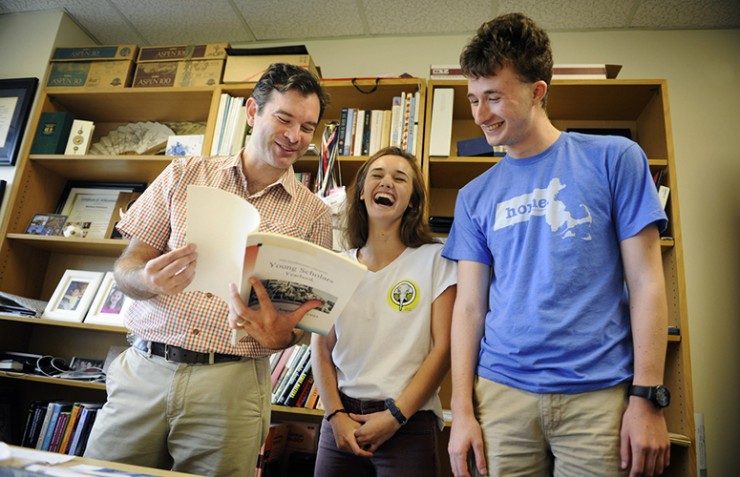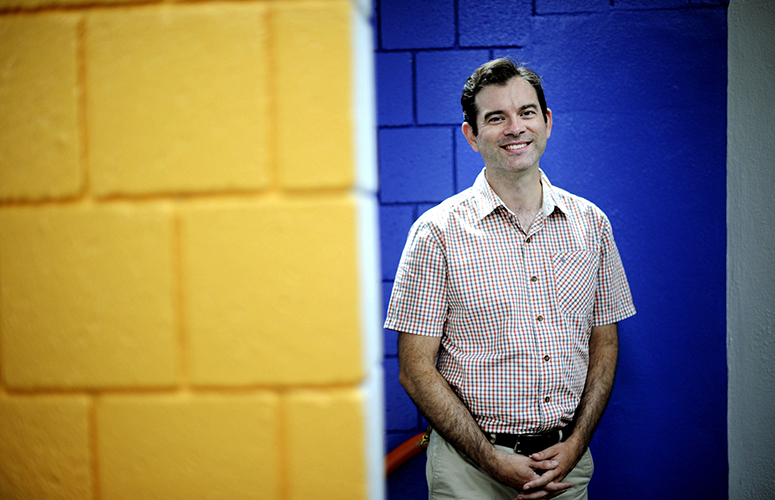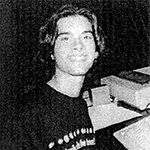Young Scholar Program Comes Full Circle

CEE Assistant Professor Matthew Eckelman is now teaching two Young Scholars students after completing the program himself twenty-one years ago.
In the summer of 1995, when Northeastern assistant professor Matthew J. Eckelman was a rising senior at Braintree High School, he felt the Earth move—or at least a small part of it.
Eckelman was a participant in Northeastern’s Young Scholars Program, a six-week paid research experience for Boston-area high school students led by Claire Duggan from the Center for STEM Education. The program, now in its 19th year, rocked his world.
The budding researcher was assigned to the lab of Mishac K. Yegian, now COE Distinguished Professor of Civil and Environmental Engineering. There, with a fellow scholar in the program, he conducted earthquake simulation experiments to evaluate the stability of different landfill liner systems—the plastic membranes that prevent liquids from seeping through landfills and contaminating the groundwater.
“Our job was to set up big boxes of sand with different liner systems and simulate an earthquake on the lab’s shaker table,” Eckelman says now, sitting in his office in the Snell Engineering Center. “It was very exciting. We’d press a button, there was a lot of action, and then we’d look at the sand displacement and for rips in the liners.”
Matthew J. Eckelman, assistant professor of civil and environmental engineering Photo by Matthew Modoono/Northeastern University
Today Eckelman—who credits the program with having introduced him to engineering practice—has come full circle. This summer he hosted two high school seniors in his Northeastern lab, guiding them, with the help of co-mentor and doctoral student Abhijeet Parvatker, in researching energy use and emissions from the production of industrial chemicals, which typically have low efficiencies. Their findings will help Eckelman and his colleagues build robust chemical lifecycle inventories to assess where in the process improvements for sustainability can be made.
“These inventories get used by thousands of researchers all around the world,” says Eckelman. “But the number of chemicals currently included from the pharmaceutical sector is very low. The work of these young scholars will essentially multiply times 10 the amount of available information on such compounds.”
Real-world contributions
That students can make such a contribution while still in high school is unprecedented, notes Duggan, director for programs and operations for Northeastern’s Center for STEM Education. “Many alumni state YSP was a powerful experience that had a direct impact on their academic and career pathway,” she says. “Other universities have summer research programs but often don’t have the success that we’ve had, with data showing the high percentage of participants who go on to pursue STEM pathways.”
The numbers tell the story: According to annual surveys of the more than 400 YSP participants through 2015, 91 percent reported that the program increased their awareness of STEM career pathways and 89 percent believed they would choose a STEM major in college.
Hands-on research is the heart of the program: This year, 17 faculty mentors hosted 34 scholars—two in each lab—on projects ranging from nanotechnology for drug delivery to imaging technology for airport-security applications.
“That setup gives them the opportunity to contribute to the big picture, not just complete a task,” says Parvatker, PhD’21, who conducted lifecycle assessments in industry before coming to Northeastern.
Eckelman’s two scholars have been thrilled at the real-world applications of their research.
MaryBeth Rockett, a rising senior at Needham High School, used modeling software to convert patents and industrial chemistry “recipes” for anesthesia drugs into chemical reaction and process flow diagrams showing every intermediate chemical step required to produce the final drug. “I never even knew that this whole career path existed,” she says. “This program opens your eyes past high school classes to the long-term goals down the road.”
Louis Sokolow, a rising senior from Brookline High School, agrees. He used AspenPlus software to simulate production of chemicals such as ethyl acetate, often used in industry as a solvent, to evaluate trade-offs between energy use and reaction yields to learn the most energy-efficient ways of making the chemicals. “I knew I was interested in chemistry, but that’s so broad,” he says. “The lifecycle assessment work gave me a concrete example of chemistry research. Now I’m thinking about studying green chemistry, which is so important as we face climate change.”
Outside the lab
The program complements the in-lab experience with outside field trips, lectures, tutorials, and social events.
The Best: A summer at Northeastern with 25 of the greatest people I’ve ever met.
— Matthew Eckelman, YSP Yearbook 1995
For example, in daily homeroom meetings YSP staff engage students in engineering and design challenges and guide them through the development of their college essays and LinkedIn profiles. In addition Northeastern administrators provide detailed information regarding financial aid, co-op opportunities, and the college application process. “I didn’t expect that,” says Rockett. “It was so generous.”
Weekly tours of corporate and government research sites around the state open doors to agencies such as the Massachusetts Clean Energy Center, in Boston, and commercial outfits such as Akamai, a content delivery network in Cambridge. Faculty presentations introduce the scholars to research in areas from 3-D printing composites to detection strategies for personalized medicine and environmental monitoring.
So it’s no surprise that both Rockett and Sokolow exclaim how the program exceeded their expectations. “Everyone was so welcoming,” says Rockett. “We had our struggles in the beginning with making the software work, but our mentors were so wonderful in guiding us through.” Adds Sokolow: “I had no idea how much I would learn, not just from my lab, but from observing in other labs.”
Their comments echo Eckelman’s “final thoughts” in his own YSP Yearbook from decades ago: “The Best: A summer at Northeastern with 25 of the greatest people I’ve ever met.”

